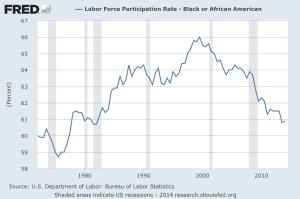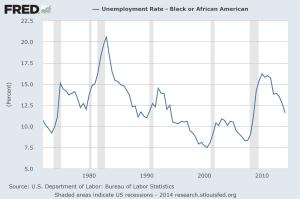Probably not the smartest idea to blog on the subject of race in a way that plays off Star Trek; after all, its a very serious issue and worthy of substantive discussion and debate. Unfortunately you won’t be getting any of that in the next few days in the media, and you certainly haven’t in the last week or so. So what’s going on?
The obvious answer is the correct one: this is going to be a very close election, and while Republicans are currently projected to take over the Senate, most of the races are all very close. Turnout will be the deciding factor, and turnout is dependent on the motivation of your base. The Republicans have it easy in this respect: their base is highly motivated to vote against Mr. Obama’s policies. The Democrats, however, have a dispirited base, and African-Americans don’t have Mr. Obama on the top of the ticket to help energize them. Without that key constituency, the Democrats appear in serious trouble.
So what do we have going on? Ms. Landrieu suggests historic racism in the South is behind animous to Mr. Obama, and likewise, latent sexism hurts strong female leaders. Now I certainly can’t quibble with either of those assertions–no doubt there is sexism and racism alive in the South as well as the rest of the country. The question is why would sexism be a problem for Ms. Landrieu now, when she has already won three previous elections in Louisiana? Why the upsurge in sexism now–precisely when the Democratic policies are in such disrepute? And when Mr. Obama has won Iowa and Colorado twice before, are we to blame southern racism for the unpopularity of Democratic candidates in both those states? Occam’s razor says we should stick with the simple explanation–these comments are all about motivating the base.
The Republicans aren’t taking this lying down, they’ve actually been on the attack mode on race as well, with these powerful ads suggesting that Democratic policies have harmed African-Americans.
Even before the last week, there were several serious articles out on how African-Americans have fared under Mr. Obama’s policies. The answer? Not well. As reported in the Financial Times,
A paradox haunts America’s first black president. African-American wealth has fallen further under Barack Obama than under any president since the Depression. Yet they are the only group that still gives him high ratings. So meagre is Mr Obama’s national approval rating that embattled Democrats have made him unwelcome in states that twice swept him to power. Those who have fared worst under Mr Obama are the ones who love him the most. You would be hard-pressed to find a better example of perception-driven politics.
Yet the FT argues that black fortunes would have been worse without him,
By no honest reckoning can Mr Obama be blamed for the decline in black America’s fortunes. Yet the facts are deeply unflattering. Since 2009, median non-white household income has dropped by almost a 10th to $33,000 a year, according to the US Federal Reserve’s survey of consumer finances. As a whole, median incomes fell by 5 per cent. But by the more telling measure of net wealth – assets minus liabilities – the numbers offer a more troubling story.
The median non-white family today has a net worth of just $18,100 – almost a fifth lower than it was when Mr Obama took office. White median wealth, on the other hand, has inched up by 1 per cent to $142,000. In 2009, white households were seven times richer than their black counterparts. That gap is now eightfold. Both in relative and absolute terms, blacks are doing worse under Mr Obama.
National Review Online also argues that African-Americans are doing worse under Mr. Obama, but offers a different conclusion: Mr. Obama’s policies have hurt blacks.
Rather than try to say who’s fault it is that African-Americans are doing worse, I’d rather finish this post by discussing what we need to make life better. None of us should feel better if someone is doing worse just because we can blame it on the other party’s policies. So I want to offer two charts on African-American employment data, the unemployment rate and labor force participation. The situation with this one minority group’s well being is obviously far more complicated than what I’m going to suggest–but my point is still extremely relevant today. Take a careful look at the data, and ask yourself two simple questions: when have African-Americans done better and when have they done worse?
The answer is found, not surprisingly, when we have significant economic growth, African-Americans do better–a rising tide lifts all boats. Notice the significant decrease in unemployment in both the 80s and the 90s. However, we’ve also had a decrease in unemployment since the end of the recession under Mr. Obama–but things aren’t better. To see why, look at the first graph of Labor Force participation. In the 80s and 90s expansions, the drop in unemployment was accompanied by robust increases in Labor Force participation–there was broad-based sharing in the prosperity. However, the expansions in the 2000s have been accompanied by significant decline in labor force participation–in the current case many of the unemployed have simply given up and dropped out of the labor force (true for whites and blacks).
So what can we make of this? Well first we can dispose of both extreme racial positions. For the racists that might think blacks are incapable of doing well, how do you explain their significant economic gains in the 80s and 90s? For the other extreme position, that blacks are still held back primarily by racism, do you think America was less racist under Mr. Reagan and Mr. Clinton than it is under Mr. Obama? The data don’t support either of these positions.
But what do they support? The answer is clear–if we want African-American fortunes to improve–and I’m sure everyone reading this blog site would agree to that, we don’t need to elect either Democrats or Republicans so much as we need to elect politicians that support a pro-growth policy. Growth cures many economic ills. If you care about the poor, embrace policies that will lift all boats.
Or you can say you care about the poor, enact policies that are supported by the elites on both coasts, and the poor will still suffer.


 Bert Wheeler
Bert Wheeler
 Jeff Haymond
Jeff Haymond
 Marc Clauson
Marc Clauson
 Mark Caleb Smith
Mark Caleb Smith
 Tom Mach
Tom Mach